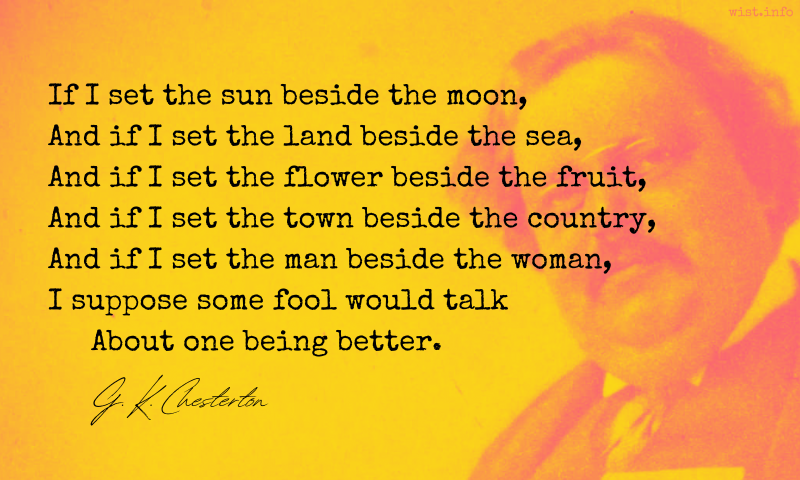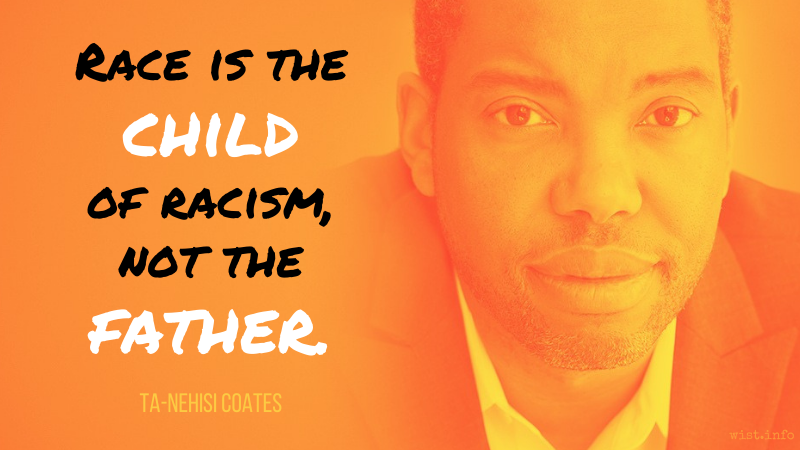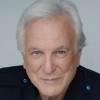If I set the sun beside the moon,
And if I set the land beside the sea,
And if I set the flower beside the fruit,
And if I set the town beside the country,
And if I set the man beside the woman,
I suppose some fool would talk
About one being better.Gilbert Keith Chesterton (1874-1936) English journalist and writer
“Comparisons”
(Source)
In "The Notebook" (1894-98). BL MS Add. 73334, fo. 5.
The poem, which has no formal title, has been printed in multiple forms. In many cases, the third line (flower/fruit) is omitted. In some cases "tower" is substituted for "town."
Quotations about:
hierarchy
Note not all quotations have been tagged, so Search may find additional quotes on this topic.
The pull of fascist politics is powerful. It simplifies human existence, gives us an object, a “them” whose supposed laziness highlights our own virtue and discipline, encourages us to identify with a forceful leader who helps us make sense of the world, whose bluntness regarding the “undeserving” people in the world is refreshing. […] Fascist politics preys on the human frailty that makes our own suffering seem bearable if we know that those we look down upon are being made to suffer more.
Jason Stanley (b. 1969) American philosopher, epistemologist, academic
How Fascism Works: The Politics of Us and Them, ch. 10 (2018)
(Source)
Fascist politics feeds off the sense of aggrieved victimization caused by loss of hierarchal status. Empires in decline are particularly susceptible to fascist politics because of this sense of loss. It is in the very nature of empire to create hierarchy; empires legitimize their colonial enterprises by the myth of their own exceptionalism. In the course of decline, the population is easily led to a sense of national humiliation that can be mobilized in fascist politics to serve various purposes.
Jason Stanley (b. 1969) American philosopher, epistemologist, academic
How Fascism Works: The Politics of Us and Them, ch. 5 (2018)
(Source)
Race is the child of racism, not the father.
Ta-Nehisi Coates (b. 1975) American writer, journalist, educator
Between the World and Me, ch. 1 (2015)
(Source)
Coates continues:
And the process of naming "the people" has never been a matter of genealogy and physiognomy so much as one of hierarchy. Difference in hue and hair is old. But the belief in the preeminence of hue and hair, the notion that these factors can correctly organize a society and that they signify deeper attributes, which are indelible -- this is the new idea at the heart of these new people who have been brought up hopelessly, tragically, deceitfully, to believe that they are white.
All these years later, the way many of us are doing church is broken and we know it, even if we do not know what to do about it. We proclaim the priesthood of all believers while we continue with hierarchical clergy, liturgy, and architecture. We follow a Lord who challenged the religious and political institutions of his time while we fund and defend our own. We speak and sing of divine transformation while we do everything in our power to maintain our equilibrium. If redeeming things continue to happen to us in spite of these deep contradictions in our life together, then I think that is because God is faithful even when we are not.
If the natural tendencies of mankind are so bad that it is not safe to permit people to be free, how is it that the tendencies of these organizers are always good? Do not the legislators and their appointed agents also belong to the human race? Or do they believe that they themselves are made of a finer clay than the rest of mankind?
[Puisque les tendances naturelles de l’humanité sont assez mauvaises pour qu’on doive lui ôter sa liberté, comment se fait-il que les tendances des organisateurs soient bonnes ? Les Législateurs et leurs agents ne font-ils pas partie du genre humain ? Se croient-ils pétris d’un autre limon que le reste des hommes?]
Frédéric Bastiat (1801-1850) French philosopher, economist, politician
The Law [La Loi] (1850) [tr. Russell]
(Source)
The tyrant grinds down his slaves and they don’t turn against him, they crush those beneath them.
Emily Brontë (1818-1848) British novelist, poet [pseud. Ellis Bell]
Wuthering Heights, ch. 11 [Heathcliff] (1847)
(Source)
It also happens to me that when I meet a clericalist, I suddenly become anti-clerical. Clericalism should not have anything to do with Christianity. St. Paul, who was the first to speak to the Gentiles, the pagans, to believers in other religions, was the first to teach us that.
Francis I (b. 1936) Argentinian Catholic Pope (2013- ) [b. Jorge Mario Bergoglio]
“How the Church Will Change,” interview with Eugenio Scalfari, La Repubblica (1 Oct 2013) [tr. K Wallace]
(Source)
One of the benefits that oppression confers upon the oppressors is that the most humble among them is made to feel superior; thus, a poor white in the South can console himself with the thought that he is not a “dirty nigger” — and the more prosperous whites cleverly exploit this pride. Similarly, the most mediocre of males feels himself a demigod as compared with women.
Simone de Beauvoir (1908-1986) French author, existentialist philosopher, feminist theorist
The Second Sex, Introduction (1950) [tr. Parshley (1952)]
See Johnson.















